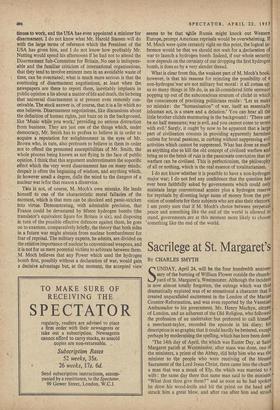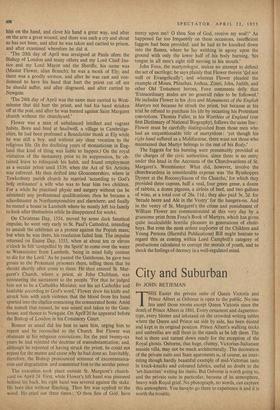Sacrilege at St. Margaret's
BY CHARLES SMYTH SUNDAY, April 24, will be the four hundredth anniver, nary of the burning of William Flower outside the church. yard of St. Margaret's, Westminster. Although the incident is now almost totally forgotten, the outrage which was thus dramatically expiated was of so sensational a character that it created unparalleled excitement in the London of the Marian Counter-Reformation, and was even reported by the Venetian Ambassador to his government. Mr. Henry Machyn, citizen of London, and an adherent of the Old Religion, who followed the profession of an undertaker but preferred to call himself a merchant-taylor, recorded the episode in his diary; his description is so graphic that it could hardly be bettered, except perhaps by modernising the spelling, which has here been done.
`The 14th day of April, the which was Easter Day, at Saint Margaret parish at Westminster, after mass was done, one of the ministers, a priest of the Abbey, did help him who was the minister to the people who were receiving of the blessed Sacrament of the Lord Jesus Christ, there came into the church a man that was a monk of Ely, the which was married to wife: the same day there that same man said to the minister. "What dost thou give them?" and as soon as he had spoken he drew his wood-knife and hit the priest on the head and struck him a great blow, and after ran after him and struck him on the hand, and clove his hand a great way, and after on the arm a great wound; and there was such a cry and shout as has not been; and after he was taken and carried to prison. and after examined wherefore he did it.
`The 20th day of April was arraigned at Pauls afore the Bishop of London and many others and my Lord Chief Jus- tice and my Lord Mayor and the Sheriffs; his name was (Master Flower, alias Branch); he was a monk of Ely; and there was a goodly sermon, and after he was cast and con- demned to have his hand that hurt the priest cut off ere he should suffer, and after disgraced, and after carried to Newgate.
`The 24th day of April was the same man carried to West- minster that did hurt the priest, and had his hand stricken off at the post, and after he was burned against Saint Margaret church without the churchyard.'
Flower was a man of unbalanced intellect and vagrant habits. Born and bred at Snailwell, a village in Cambridge- shire, he had been professed a Benedictine monk at Ely while he was still a boy. and without any clear vocation to the religious life. (In the declining years of monasticism in Eng- land that kind of thing was liable to happen.) On the royal visitation of the monastery prior to its suppression, he ob- tained leave to relinquish his habit, and found employment as a secular priest until 1539, when the Act of Six Articles was enforced. He then drifted into Gloucestershire, where in Tewkesbury parish church he married 'according to God's holy ordinance' a wife who was to bear him two children. For a while he practised physic and surgery without (as he admitted) any professional qualifications; then he became a schoolmaster in Northamptonshire and elsewhere; and finally he rented a house in Lambeth where he mostly left his family to look after themselves while he disappeared for weeks. mercy upon me! 0 thou Son of God. receive my soul!' As happened far too frequently on these occasions, insufficient faggots had been provided, and he had to be knocked down into the flames, where he lay writhing in agony upon the ground with only the lower half of his body burning, 'his tongue in all men's sight still moving in his mouth.'
John Foxe, the martyrologist, makes no attempt to defend the act of sacrilege; he says plainly that Flower therein 'did not well or Evangelically'; and whereas Flower pleaded the example of Moses, Phinehas, Joshua, Zimri. Jehu, Judith, and other Old Testament heroes, Foxe comments drily that 'Extraordinary zeales are no generall rules to be followed.' He includes Flower in his Acts and Monuments of the English Martyrs not because he struck the priest, but because at his trial he refused to purchase his life by recanting his Protestant convictions. Thomas Fuller, in his Worthies of England (our first Dictionary of National Biography), follows the same line: Flower must be carefully distinguished from those men who had an unquestionable title of martyrdom : 'yet though his right hand suffered as a Malefactour, there want not those who maintained that Martyr belongs to the rest of his Body.'
The faggots for his burning were presumably provided at the charges of the civic authorities, since there is no entry under this head in ihe Accounts of the Churchwardens of St. Margaret's, Westminster. What did, however, involve the churchwardens in considerable expense was 'the Bysshoppes Dynner at the Reconcyliacon of the Churche,' for which they provided three capons, half a veal, four green geese, a dozen of rabbits, a dozen pigeons, a sirloin of beef, and two gallons of wine, at a total cost of 28s. 11d.; they also paid 3s. 2d. for 'breade beere and Ale in the Vestry' for the hangers-on. And in the vestry of St. Margaret's the crime and punishment of William Flower are commemorated at this very day by a gruesome print from Foxe's Book of Martyrs, which has given quite incalculable horrific pleasure, to generations of choir- boys. But even the most ardent supporter of the Children and Young Persons (Harmful Publications) Bill might hesitate to regard this as coming within Lord Campbell's category of productions calculated to corrupt the morals of youth, and to shock the feelings of decency in a well-regulated mind.











































 Previous page
Previous page